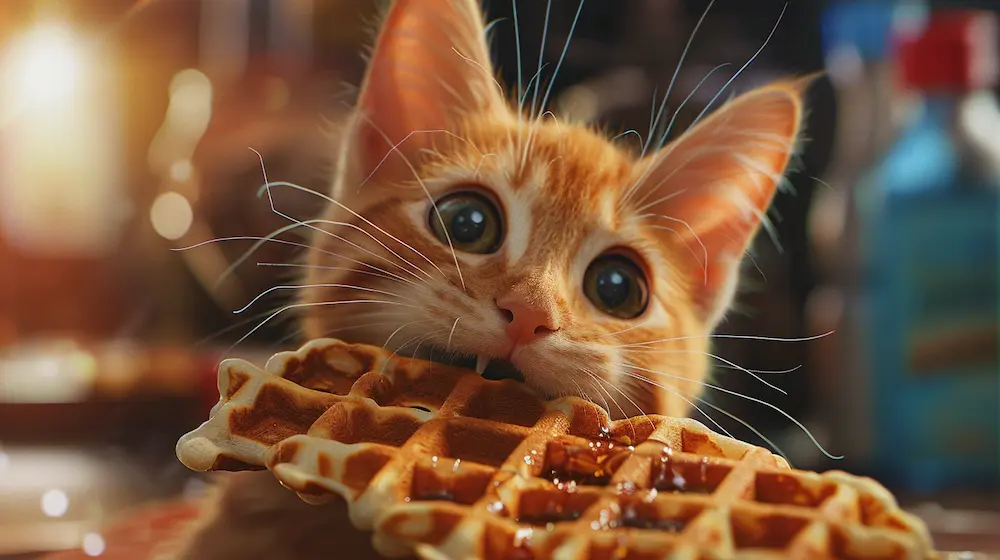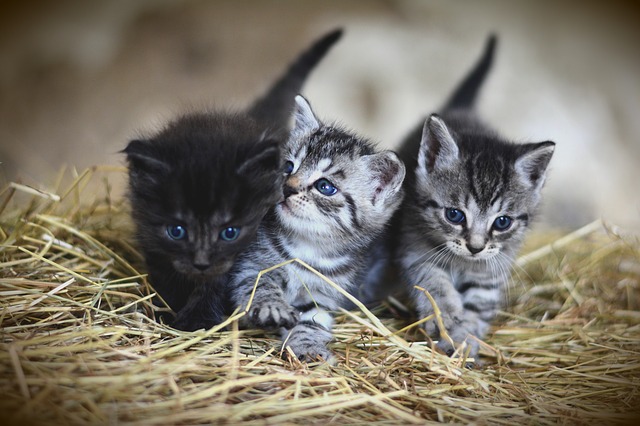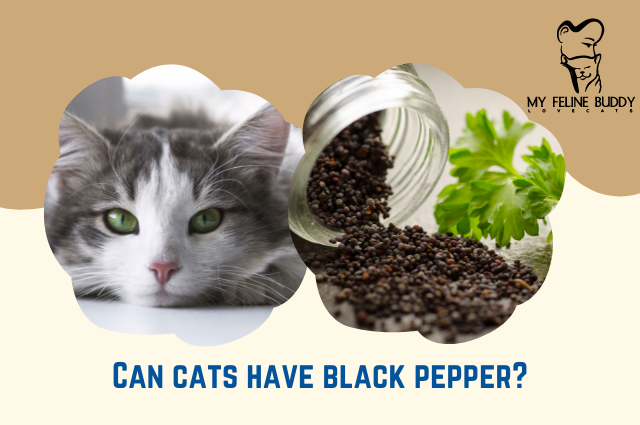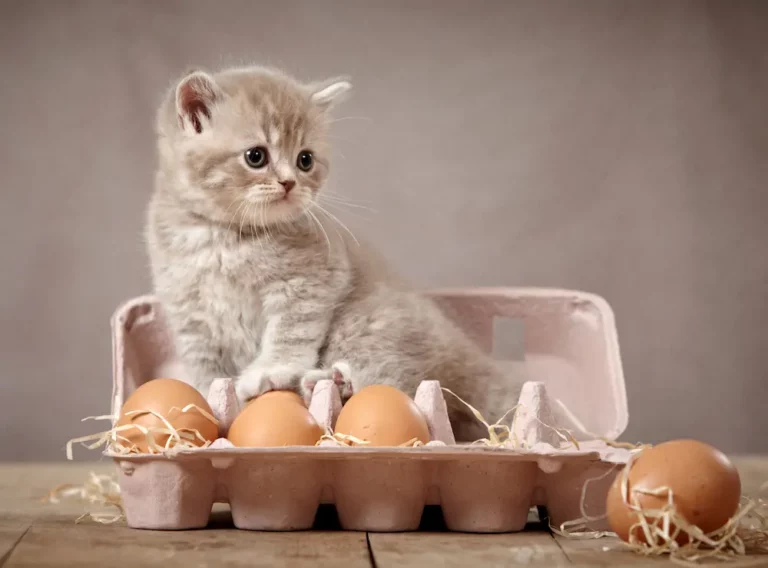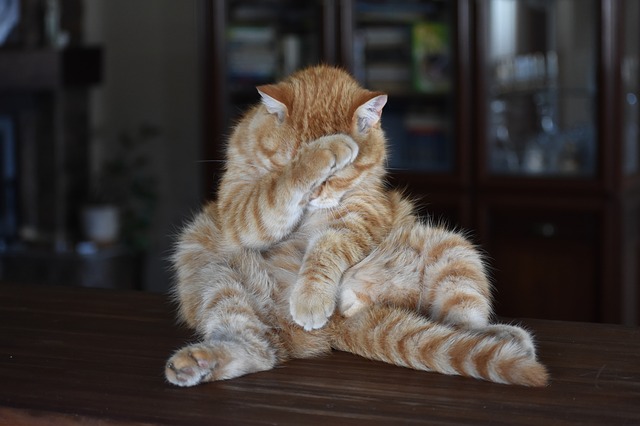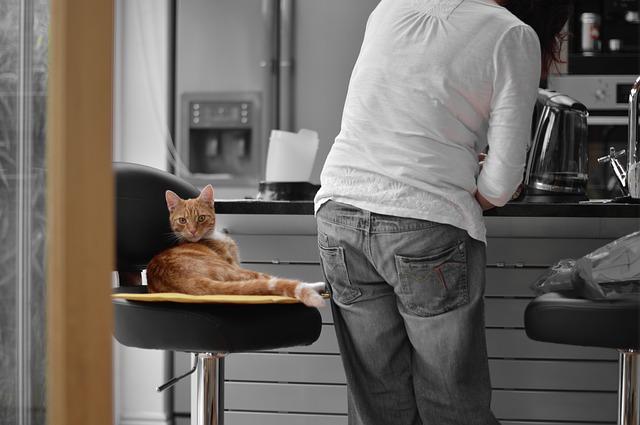Can Cats Eat Waffles? Here’s What You Need to Know!
I’ve always wondered if cats can join in the breakfast fun and munch on waffles.
But here’s the deal: cats are obligate carnivores, meaning their diet needs to be primarily meat-based.
Waffles, with their mix of flour, sugar, dairy, and eggs, aren’t exactly tailored to
Plus, let’s not forget potential digestive issues and allergies.
But before you completely cross waffles off your
So, what’s the real scoop on cats and waffles?
Waffles and Cat Nutrition
When considering whether cats can eat waffles, it’s important to understand how the ingredients in waffles align with a
Cats are obligate carnivores, meaning they thrive on a diet primarily composed of meat.
So, diving into the world of waffles, we need to ask: do they offer anything beneficial for our furry companions?
Much like how Spider-Man wouldn’t rely on a banana for his superpowers, cats don’t get their energy from carbs.
They need protein, taurine, and specific vitamins and minerals.
Waffles, on the other hand, are carb-heavy and often contain sugar and dairy, which aren’t ideal for our whiskered pals.
Since cats can’t efficiently digest carbs, feeding them waffles could lead to unnecessary weight gain or digestive issues.
Moreover, while we might enjoy a delicious breakfast treat, it’s important to remember that cats have very different dietary requirements.
Their bodies are designed to process animal-based proteins and fats, not the starchy goodness found in waffles.
Common Waffle Ingredients
Breaking down the common ingredients in waffles, let’s see what exactly makes them a questionable choice for our kitty companions.
First off, waffles typically contain flour, eggs, milk, sugar, and butter. While these ingredients might combine to create a delicious breakfast for us, they pose several issues for our beloved cats.
Here’s a quick breakdown of common waffle ingredients:
| Ingredient | Potential Issue for Cats |
|---|---|
| Flour | Difficult to digest, low in protein |
| Eggs | Potential allergen |
| Milk | Lactose intolerance |
| Sugar | No nutritional value, can cause obesity |
| Butter | High in fat, can cause pancreatitis |
Flour is mostly carbohydrates, which cats don’t need in high amounts. Their digestive systems aren’t set up to process them efficiently.
Eggs, while a good protein source for humans, can sometimes cause allergic reactions in cats.
Milk is another concern; many adult cats are lactose intolerant and could end up with an upset stomach or diarrhea.
Then there’s sugar and butter. Sugar offers absolutely no nutritional benefit to cats and can lead to obesity and dental issues.
Butter, being high in fat, can contribute to obesity and even pancreatitis.
As much as we love to share, waffles aren’t the best treat for our cats.
Sugar and Syrup Concerns
Let’s get real: the sugar and syrup we drizzle on our waffles might make them taste heavenly, but they’re a nutritional nightmare for our
When we give them sugary treats, it’s like asking a fish to climb a tree—completely unnatural and potentially harmful.
Sugar can lead to obesity, diabetes, and dental issues in cats.
Unlike humans, cats don’t have a sweet tooth; they lack taste receptors for sweetness.
So, when we offer them sugary foods, it’s not just unnecessary—it’s detrimental.
And don’t even get me started on syrup.
Many syrups contain xylitol, an artificial sweetener that’s toxic to cats and can cause rapid insulin release, leading to hypoglycemia.
Think of it this way: We wouldn’t serve our cats a double espresso just because we love the pick-me-up.
Similarly, sugary and syrupy waffles should be off the menu for our furry companions.
If you’re committed to serving others, especially your pets, then let’s stick to what keeps them healthy and happy.
Your
Dairy Products in Waffles
Many waffles contain dairy products like milk and butter, which can spell trouble for our
As a devoted pet parent, I know how tempting it is to share our breakfast delights with our beloved companions.
However, it’s important to understand that many cats are lactose intolerant.
When cats consume dairy products, it can lead to digestive issues, such as upset stomachs, diarrhea, and bloating.
It’s like giving Spider-Man a glass of milk—sure, he might enjoy it, but it won’t be pretty afterward!
Here’s a quick breakdown of common dairy ingredients in waffles and their effects on cats:
| Dairy Ingredient | Possible Effects on Cats |
|---|---|
| Milk | Upset stomach, diarrhea |
| Butter | Digestive discomfort, obesity |
| Cream | Similar to milk, even richer |
| Cheese | Usually high in lactose |
Our whiskered companions’ digestive systems are more like Tony Stark’s arc reactor—complex and sensitive.
Cats lack the enzyme lactase, which is needed to break down lactose found in dairy.
Without this enzyme, their bodies can’t properly digest these products.
So, while that buttery waffle might be calling your name, remember to keep it away from your beloved buddy.
They’ll thank you for it with purrs and head bumps instead of an upset tummy!
Potential Allergens
While dairy in waffles can wreak havoc on a
Cats are often sensitive to ingredients like gluten, which is found in the flour used to make waffles.
Gluten can cause gastrointestinal issues and even trigger allergic reactions in some cats.
But let’s not forget about eggs, another common ingredient in waffles.
Some cats are allergic to eggs, which can lead to symptoms like itching, skin rashes, or even respiratory issues.
Imagine your kitty pal channeling their inner Garfield but ending up in a sneeze-fest instead of enjoying lasagna.
Another concern is sugar.
Many waffles contain added sugar, which isn’t just an empty calorie for cats; it can lead to obesity and diabetes.
And if you’re a fan of flavored or chocolate waffles, keep in mind that chocolate is toxic to cats.
Eating even a small amount can cause vomiting, diarrhea, and worse.
Signs of Digestive Issues
Recognizing the signs of digestive issues in your
We all love our beloved cats like they’re part of the family, so when they’re feeling off, we notice.
Imagine your
One telltale sign is a change in their litter box habits.
If you see diarrhea or constipation, it’s an important indicator.
Also, pay attention if they’re vomiting frequently.
Sure, cats cough up hairballs sometimes, but if it’s happening more often, something might be wrong.
Another indicator is a loss of appetite.
Cats are picky eaters, but if they’re consistently shunning food, it’s worth noting.
Look for changes in their behavior, too. Are they more lethargic or hiding away?
These can be signs that their tummy isn’t right.
Consulting Your Veterinarian
When your
Trust me, I know it can be tempting to play Dr. Google, but your vet has the expertise to provide accurate advice.
Think of your vet as the Sherlock Holmes of pet health, pinpointing issues that we might miss.
Here’s what you can expect when you consult your veterinarian:
- Thorough Tests: Your vet may perform blood tests, X-rays, or ultrasounds to identify the root cause of your
cat ‘s discomfort. - Tailored Recommendations: They’ll suggest specific dietary changes or prescribe a special diet tailored to your
cat ‘s needs. - Treatment Plans: Whether it’s medication, lifestyle changes, or sometimes even surgery, your vet will outline a detailed treatment plan.
Cats are like quirky, furry little enigmas, and each one has unique health needs.
Your vet can decode these mysteries using a blend of science and experience.
Conclusion
To sum up, waffles aren’t a good snack for our kitty companions.
They’re packed with ingredients like sugar, dairy, and allergens that can mess with a
Cats thrive on protein-rich, species-appropriate foods, not our breakfast treats.
So, let’s keep the waffles for ourselves and toss Fluffy a healthy, vet-approved snack instead.
Trust me, your
